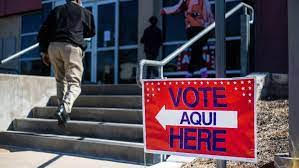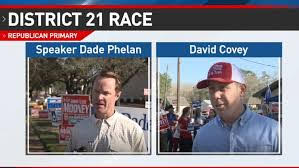
Here’s a quick recap of what happened over the last week:
Who and How Many Voted

Roughly 3.2 million Texans cast a ballot in Tuesday’s primary election, with Republicans voting in much higher numbers than Democrats. Republicans cast 2.3 million ballots compared to 975,000 ballots cast by Democrats. Overall, this is a decrease from the 4 million total ballots cast in the 2020 primary elections, the last time a Presidential primary was held. The decrease in turnout is mostly attributable to the Democrats, who in the 2020 primary had 2.1 million voters participate in their primary. That year, they surpassed the Republican turnout by 676,000 votes.
The overall figures include early voting, where roughly 1.8 million cast a ballot during the early period when 1,262,067 voted early in the Republican primary and 526,889 voted in the Democratic primary, for a total turnout during the early period of 10.1%.
The decrease among the Democratic voters is due in large part to lack of enthusiasm at the top of the ticket for President Joe Biden. The race for the Democratic nomination for US Senate – won by Congressman Colin Allred – also never generated any real interest among Democratic primary voters. The decline in voter turnout was most evident in the state largest counties – Harris, Dallas, Bexar, Travis – where turnout this year was only 14% compared to 24% in the same counties in 2020. Rural counties saw a dip as well, with a 4% decline in turnout compared to four years ago.
Here is stunning evidence of the voter apathy here in Texas, that is also prevalent throughout the country. Even though 3.2 million Texans voted in the primary, 14.7 million registered Texans did not vote. Plus, there are another 2.1 million Texans who are eligible but not registered to vote, meaning 16.8 million Texans eligible to vote did not cast a ballot.
Speaker’s Runoff Election

As I mentioned in my reports earlier this week, the incumbent Speaker of the Texas House has been forced into a runoff for the first time in 50 years. Beaumont Republican Dade Phelan is in a fight to save his political career in a runoff that promises to be one of the most expensive and high-profile House races this state has ever seen. His opponent – David Covey – has the backing of President Trump, Lt. Gov. Dan Patrick, and Attorney General Ken Paxton. Gov. Abbott – asked this week if he was going to weigh in on the runoff – said his sole focus is to continue to elect candidates and officeholders that support private school vouchers. The growing influence of the far-right wing of the Republican Party has already defeated 9 Republican House incumbents and seeks to add a House Speaker to their record.
On Wednesday, Lt. Governor Patrick released a statement – which some call a warning – saying “the expiration date on Dade Phelan’s Speakership is plainly written…and last night was a referendum on his leadership and Republican voters have spoken with clarity.” Lt. Governor Patrick and Speaker Phelan have long been at odds over policies and legislation that have come before both bodies of the legislature. Patrick has always questioned Phelan’s conservative credentials. The situation came to a head in 2023 when the House impeached AG Ken Paxton and then failed to pass the private school voucher legislation considered during the last two special sessions of 2023.
In the time leading up to the May 28th runoff date, look not only for continued criticism of Phelan from Patrick, but also for President Trump to aggressively campaign for Covey.
Phelan has never even had an opponent during his tenure in the Texas House, and enjoys the support of former Governor Rick Perry, who went to the southeast Texas district to rally twice for Phelan before Tuesday’s primary election. Perry has promised more of the same to try and offset the Trump/Patrick momentum. Phelan is from a very prominent southeast Texas family and touts his conservative credentials and increased funding for projects in the district as reasons to send him back to Austin.
Covey is in the oil and gas business and claims he is the only true conservative in the race and criticizes Phelan for selling out his conservative views to the Democrats just so he could secure the Speaker’s office. But in the end, the endorsements that Covey has received are not necessarily for him, they are more against Phelan due to the long and ongoing feud between the Speaker and Lt. Governor.
Wildfires in Panhandle

The Texas A&M Forest Service reported yesterday that its investigators have concluded that the massive fires in the Texas Panhandle were ignited by power lines. The area’s utility provider – Xcel Energy – has acknowledged that their equipment played a role in the ignitions of the fires but did not say how it came to that conclusion. So far, the fires have burned over 1,700 square miles – 1 million acres — and destroyed over 500 of homes and other structures. As of yesterday, the Forest Service reported that the fire was about 74% contained. Area homeowners have filed a lawsuit accusing Xcel of neglecting to properly maintain their power lines, an accusation the company has denied. The company also said it will continue to work with emergency responders to assist those impacted by the fires.
Border News

Just two days after the US 5th Circuit Court of Appeals overturned a lower court ruling that blocked a new Texas law empowering state law enforcement to arrest migrants, the US Supreme Court stayed that ruling, delaying the effective date of the law. Senate Bill 4, passed during the special session in the fall, grants state level law enforcement officers the power to arrest anyone suspected of entering the country illegally on state trespassing charges. The US Department of Justice and several immigration rights groups sued to stop the law from taking effect. Federal Judge David Ezra of the Western District of the United States ruled last week that the law was “patently unconstitutional” and said immigration enforcement was the sole responsibility of the federal government. Ezra placed a temporary injunction on allowing the law to go into effect.
The 5th Circuit issued an order on Saturday – without explanation – that set aside the lower court ruling and would have allowed the law to go into effect while the battle over the constitutionality of the law plays out through the legal process. Then on Monday, the US Supreme Court issued the temporary stay until March 13th while they decide whether or not the law is allowed to take effect while the legal proceedings continue.
Political Notes
Gov. Abbott and Lt. Governor Patrick seized on their momentum from Tuesday and have turned their attention to the runoffs. On Wednesday, both endorsed Katrina Pierson in her challenge to Republican Rep. Justin Holland of Rockwall. Holland trailed Pierson going into runoff by one point, 39% to 38%. Pierson is making her first run for public office but did work for the Trump administration during his first term.
Here are the facts regarding the runoff:
The runoff election is May 28th.
If you didn’t vote in the primary on Tuesday, you can still vote in the runoff. But if you did vote, you must vote in the same party runoff. The last day to register to vote in the runoff is April 29th.
If you are voting by mail, the deadline for an application for mail-in voting is May 17th.
Early voting runs from Monday, May 20th to Friday, May 24th. Polls will be open 7AM to 7PM for early voting.
What’s Next??
Hard to say what’s next. With the House in disarray, interim study issues may not be released until after the runoff – if at all. The Senate may issue interim study issues soon, but no date has been set.
